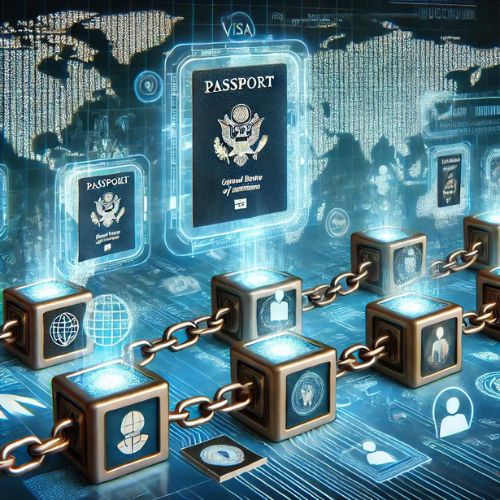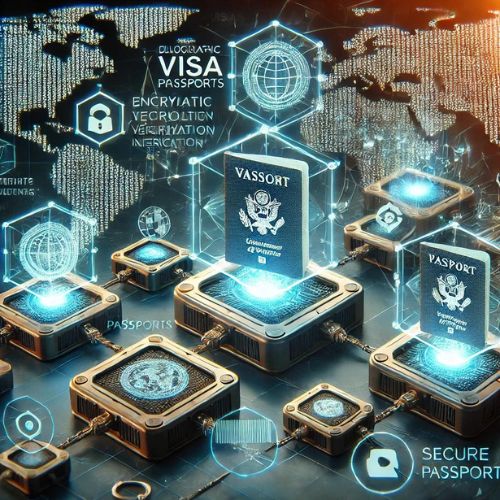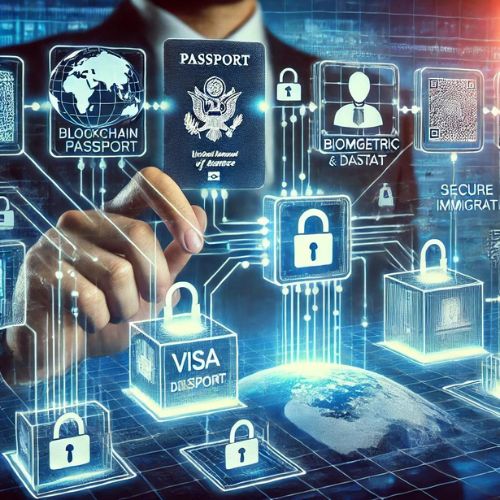Introduction
Blockchain technology is widely known for its role in powering cryptocurrencies like Bitcoin, but its applications extend far beyond digital currencies. One of the emerging uses of blockchain is in visa processing, where it promises to enhance security, streamline processes, and provide a transparent and efficient system for both applicants and governments. In this article, we will explore how blockchain technology is revolutionizing visa processing, its benefits, and the future potential of this innovative technology.

What is Blockchain Technology?
Blockchain is a decentralized, distributed ledger that records transactions across multiple computers. Each record, or “block,” contains data about a specific transaction, and once a block is added to the chain, it is nearly impossible to alter or delete. This makes blockchain highly secure and tamper-proof, providing an immutable record of transactions.
In visa processing, blockchain can be used to store and verify important data such as personal details, travel history, and visa status, ensuring that the information is accurate and securely maintained.
How Blockchain is Transforming Visa Processing
- Secure Storage of Applicant DataOne of the biggest challenges in visa processing is ensuring the security of personal data. Traditional visa processing systems rely on centralized databases, which are vulnerable to hacking, data breaches, and tampering. With blockchain, personal information can be securely stored on a decentralized network, making it nearly impossible for unauthorized individuals to access or alter the data.Blockchain technology ensures that once an applicant’s data is stored, it cannot be modified without detection. This provides a higher level of security compared to traditional databases, reducing the risk of identity theft and fraud. Additionally, because blockchain operates on a decentralized system, there is no single point of failure, making it more resilient to cyberattacks.
- Streamlining Document VerificationBlockchain can simplify the verification process by providing a secure, transparent platform for storing and sharing documents. Visa applications often require applicants to submit various supporting documents, such as passports, financial records, and letters of invitation. These documents must be verified by immigration authorities, which can be time-consuming and prone to errors.With blockchain, applicants can upload their documents to the decentralized network, where they are securely stored. Immigration authorities can then access and verify the authenticity of these documents instantly, eliminating the need for manual checks. Blockchain ensures that the documents are genuine, as any attempt to alter them will be recorded and flagged, preventing fraud.
- Cross-Border CollaborationOne of the challenges in global visa processing is the lack of coordination and collaboration between different countries. Each country has its own visa requirements, databases, and verification processes, making it difficult for governments to share information about travelers.Blockchain can facilitate cross-border collaboration by providing a standardized, transparent system for sharing visa-related information. Countries can use blockchain to verify an applicant’s travel history, previous visas, and other relevant details without having to rely on slow and inefficient communication methods. This improves the speed and accuracy of visa processing, particularly for frequent travelers or those with complex travel histories.
- Reducing Fraud in Visa ApplicationsFraudulent visa applications are a significant concern for immigration authorities, as fake documents and false identities can be used to gain entry into a country illegally. Blockchain’s transparency and immutability make it an ideal tool for detecting and preventing fraud in visa applications.With blockchain, every piece of data entered into the system is recorded and cannot be altered without leaving a trace. This makes it easier for immigration authorities to detect inconsistencies or fraudulent attempts. For example, if an applicant submits forged documents, the blockchain system will flag the attempt, preventing the fraudulent application from moving forward. This reduces the risk of unauthorized individuals entering the country.
- Smart Contracts for Visa ProcessingAnother innovative application of blockchain in visa processing is the use of smart contracts. A smart contract is a self-executing contract with the terms of the agreement written directly into code. In visa processing, smart contracts can automate certain aspects of the application process, reducing the need for manual intervention and speeding up processing times.For example, a smart contract could be programmed to automatically approve a visa application once all the required documents have been submitted and verified. This would reduce the time it takes to process applications, as the system would automatically execute the necessary steps without waiting for human approval. Smart contracts can also ensure that visa requirements, such as financial thresholds or health clearances, are met before the application is approved.
Benefits of Blockchain in Visa Processing
- Enhanced SecurityOne of the most significant benefits of blockchain technology is its ability to provide enhanced security for visa processing. With its decentralized structure and tamper-proof records, blockchain ensures that personal information and documents are protected from unauthorized access and fraud. This is particularly important in visa processing, where sensitive personal data is involved.
- Improved TransparencyBlockchain’s transparency is another key advantage for visa processing. Every action taken on the blockchain is recorded and visible to all parties involved, providing a clear and auditable trail of the visa application process. This transparency builds trust between applicants and immigration authorities, as both parties can see the status and progress of the application at any time.
- Faster Processing TimesBy automating the verification and approval processes through smart contracts, blockchain can significantly reduce the time it takes to process visa applications. This is particularly beneficial during peak travel seasons or for urgent visa applications, where delays can be costly and inconvenient for travelers.
- Cost Savings for GovernmentsImplementing blockchain technology in visa processing can lead to significant cost savings for governments. By reducing the need for manual document verification and approval, blockchain cuts down on administrative costs and allows governments to process more applications with fewer resources. Additionally, the increased security provided by blockchain reduces the risk of fraud, saving governments money that would otherwise be spent on investigating and correcting fraudulent applications.
Challenges and Considerations
While blockchain holds great promise for visa processing, there are challenges to consider. Implementing blockchain systems requires significant investment in infrastructure and technology. Additionally, the decentralized nature of blockchain may raise concerns about data privacy and ownership, particularly when it comes to sharing sensitive information across borders.
Governments will need to work together to establish international standards and regulations for the use of blockchain in visa processing, ensuring that the technology is used in a way that protects the rights of applicants while enhancing efficiency and security.

Conclusion
Blockchain technology is poised to revolutionize visa processing by providing enhanced security, transparency, and efficiency. From secure data storage to automated verification processes, blockchain offers numerous benefits that can transform how governments handle visa applications. While there are challenges to address, the future of visa processing with blockchain looks promising, offering a secure and streamlined system that benefits both applicants and immigration authorities.
As more countries explore the use of blockchain, it is likely that we will see a global shift towards a more secure, transparent, and efficient visa processing system in the near future.

